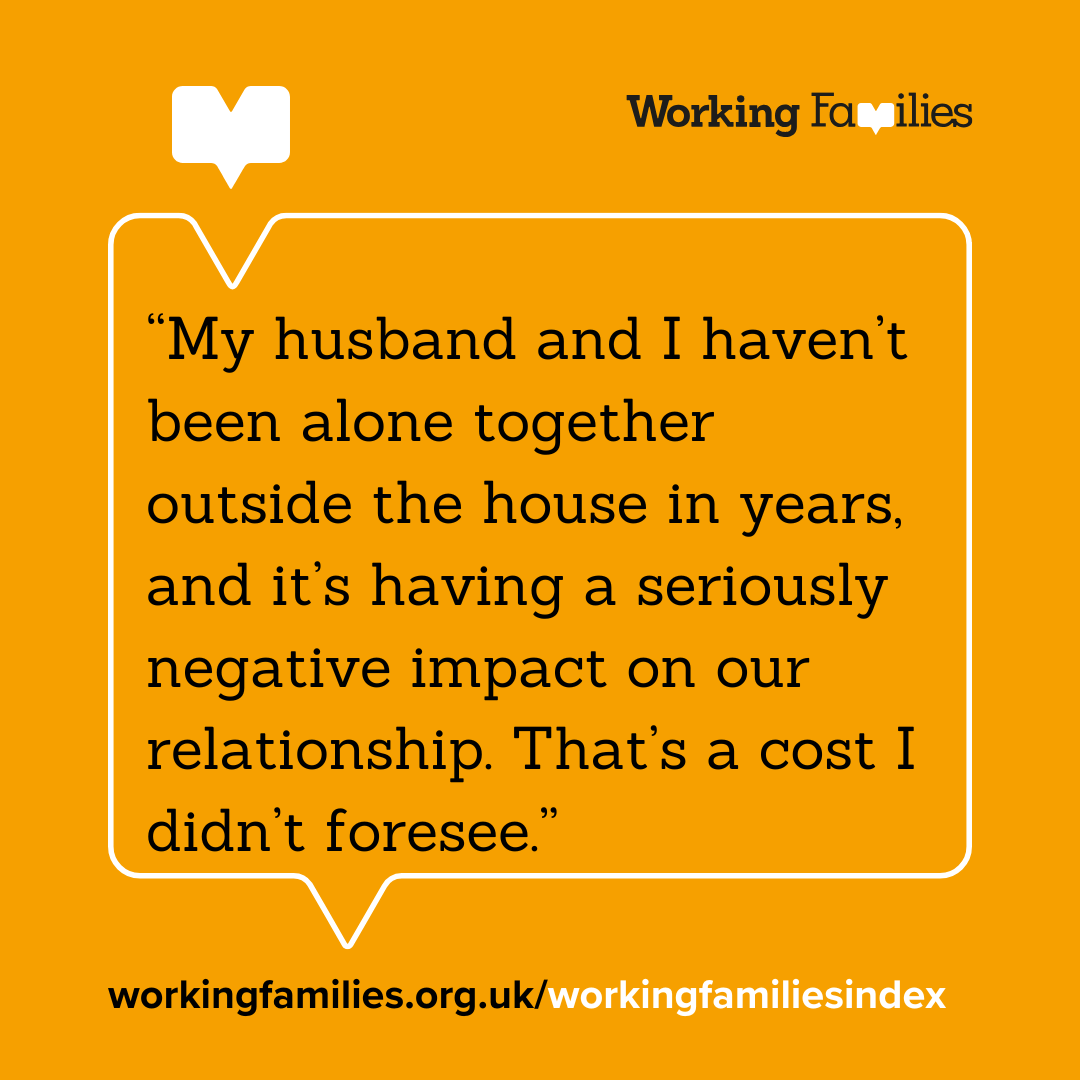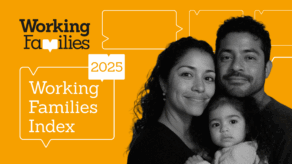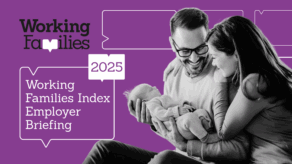Working Families Index: voices from our Parents and Carers Advisory Panel
Published: 21 May 2025

Our advisory panel is made up of almost 30 parents and carers who volunteer their time to share insights that inform our work.
Much of their experience of parenting and caring chime with the findings from Working Families Index 2025, and so we’re sharing their voices to bring to life the everyday challenges facing parents and carers.
I’m a father of seven and my partner has a disability.
When I was in the position of requesting flexible working my bosses looked at me dumbfounded as if to say ‘why would you be wanting carers leave and flexible working, you’re a man’. That’s the norm of society and it needs to change, because running a house isn’t a ‘female’ job. It is about having the courage to use flexible working policies, because if that request is declined, you’re automatically treated differently, as though you’re not committed to the job. I had to leave my job and start my own business because I went through two or three employers that just wouldn’t support flexible working. It’s not easy from a dad perspective. There are loads of dads out there that would like to do more for their families and be hands on. The more government policies support dads, the more we can help mums, and help each other.
We struggle endlessly. Our kids’ nursery was wonderful, and we had a babysitter at the time when they were nursery-aged but she no longer works as a babysitter, and we have nobody else to help us now.
My husband’s family are much older than us, his siblings are looking after their own grandchildren on the other side of the country and my family live in North America.
My husband and I haven’t been alone together outside the house in years, and it’s having a seriously negative impact on our relationship. That’s a cost I didn’t foresee.
Childcare has been a barrier, but the barrier is created by a combination of working in a sector where over-work is expected and necessary for progression or promotion and having childcare responsibilities. So, the problem is two-fold. I can no longer spend my weekends and evenings working like I did when I was younger.
When it comes to looking at promotions or opportunities which would involve more time in the office, the cost of childcare is prohibitively expensive. Making the calculation is heartbreaking, when you work out that any pay increase would have to be significant in order to go for the role. It’s not easy to convince an employer you need more money because of your caring responsibilities. I have a disabled child and so it makes it tricky to find the right childcare. It’s not for lack of ambition, but the circumstances we’re in.
For me, childcare was a barrier, and eventually I had to give up work because I wasn’t able to work from home. I have a disabled child and finding a childminder for a child with special needs was impossible. Whilst I think many childminders have to state that they accept SEN children, I was finding that they wouldn’t. I was advised to approach the council to let them know that they weren’t taking on SEN children, but I don’t want someone to care for my child if they don’t want to. The other option was to have my child at home with a nanny but that was so expensive. I was prepared to pay, with some support, but the nanny I found wasn’t Ofsted registered.
I’ve currently got one child and we’re in that place of wondering if we have another child. I’ve just stepped into a more senior role, and in the back of my mind, I’m wondering if I can do this job and have another baby with the time commitments. Mentally preparing yourself to juggle progressing in your career while growing your family is an unspoken barrier. On paper, everything looks fine but it’s the internal worries and what goes through your mind that really impacts on these big life decisions.
My child’s just started school, and while we found nursery hours worked well for us, , the school set-up has been really anxiety-inducing, trying to manage the pick-up and the cost of after-school clubs. We’re going through what lots of parents have been through before but it’s certainly been very stressful.
“You have to be a bit courageous with your employer. Luckily I’ve been with mine for a long time so I feel I have the confidence to be more flexible and take advantage of what’s offered, but I do think there are unspoken barriers. You can have all the flexible and agile working policies in the world but you have to have the confidence to use them. And if you don’t have a sympathetic manager then there’s always that fear of being called out for it.
“So much depends on your employer, your individual manager and whether they have empathy or personal experience. My husband didn’t have one of those managers and had to log his hours to the minute, which made the nursery runs really stressful. He actually got picked up for doing too many hours and was told ‘maybe you can’t do your job if you have to do more hours’ so it was lose-lose situation for us.
As the sole earner in the household when my children were born, being self-employed offered a high degree of flexibility. I could do the school runs, support them with activities during school holidays, and so on. But the trade-off was that I had to turn down opportunities for paid work that would have clashed with these timings. And when my kids started to struggle with school due to what was subsequently diagnosed as special education needs, I had to turn down even more paid opportunities to attend meetings with teachers and provide the support they needed.
“The upshot of all this was that through their childhood years we were pushed further into poverty. I always managed to cover the essentials, like bills and food, but we couldn’t afford things like holidays or big presents which we saw our children’s friend’s families taking and having, which meant that they were had increasing stigma attached to them by their peers. And seeing their friends go on trips or receive expensive gifts added to the stigma they felt, which was heartbreaking.

Working Families Index
The Working Families Index is the most comprehensive study of the experience of work and family life in the UK.

Working Families Index 2025 – Employer Briefing
In this briefing we highlight the key findings of the 2025 Working Families Index alongside actions that can be introduced in your workplace to empower employees to meet their caring and work responsibilities and fulfil their potential within your organisation.